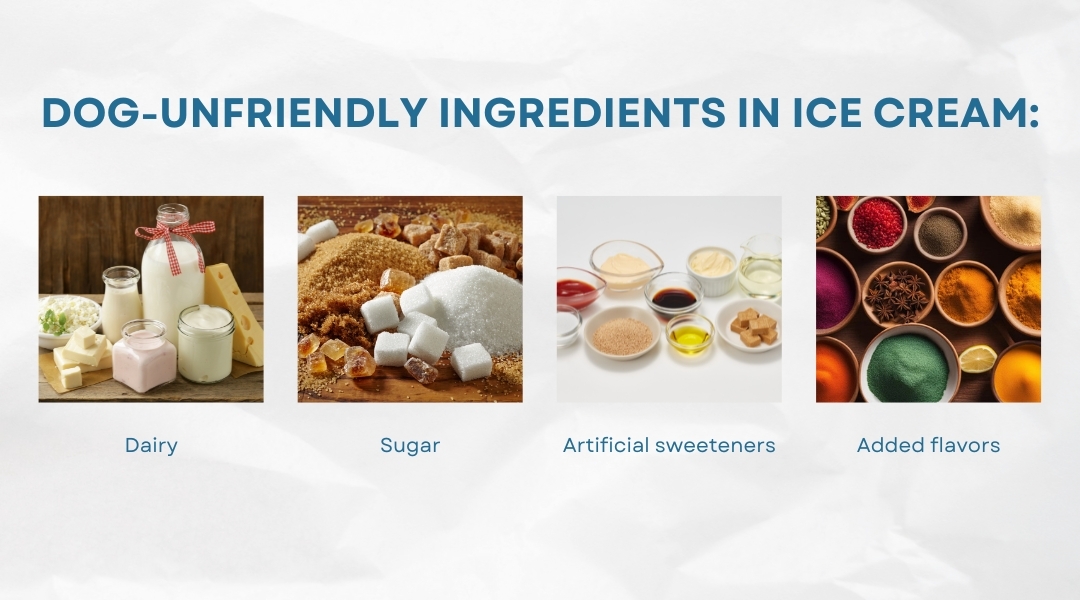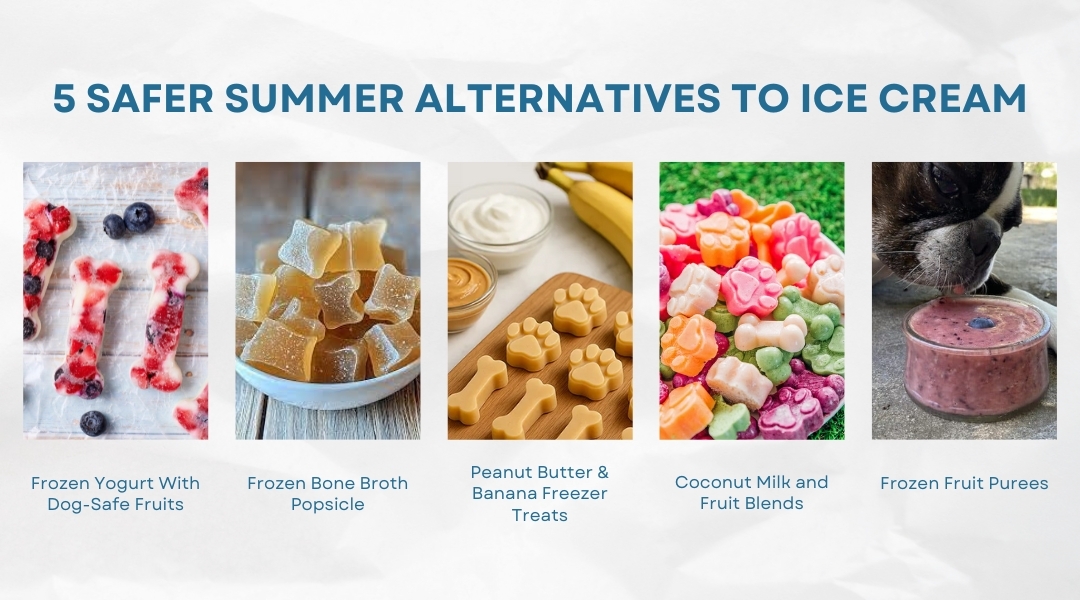Can Dogs Eat Ice Cream? Safe Summer Treats for Your Furry Friend
Posted by Volhard Dog Nutrition on Jun 10th 2025
Wide puppy eyes locked on your melting cone; sound familiar? Dogs are masters at begging for a bite of anything that looks and smells delicious.
While it’s tempting to hand over a spoonful of ice cream on a hot day, dairy and added sugars can turn a sweet gesture into a digestive disaster.
But don’t worry. Plenty of frozen, tail-wag-worthy options skip the questionable ingredients and deliver real refreshment!
What you will learn:
- Why traditional ice cream is not a safe treat for most dogs, including the risks posed by dairy, sugar, and toxic ingredients.
- The common symptoms and health problems dogs may experience from eating ice cream or cones, and why some dogs are especially sensitive.
- Healthier, dog-friendly frozen treat alternatives you can make at home to keep your pup cool and happy all summer long.
Is Ice Cream Safe for Dogs?
Traditional ice cream might be a summertime staple for humans, but it’s not an ideal dog treat.
While a small lick here and there may not cause immediate harm, many of the ingredients in regular ice cream can upset a dog’s digestive system.
Dairy, sugar, artificial sweeteners, and added flavors can all contribute to problems ranging from stomach discomfort to toxicity.
The safest bet? Skip the store-bought scoop and explore dog-safe alternatives that are made with your pet’s health in mind.

Many Dogs Are Lactose Intolerant
Many dogs lose their ability to digest lactose properly after puppyhood.
That means dairy products like ice cream can lead to gastrointestinal issues such as gas, bloating, cramping, and diarrhea.
Sugar, Xylitol, and Other Ingredients to Avoid
Sugar might make ice cream sweet, but it offers no nutritional value for dogs and can contribute to obesity, dental issues, and blood sugar spikes.
Even more dangerous is xylitol, a common sugar substitute found in many sugar-free or low-calorie desserts. It is highly toxic to dogs and can cause a rapid insulin release, leading to life-threatening hypoglycemia (low blood sugar).
Other problematic ingredients to watch for include chocolate, coffee, raisins, macadamia nuts, and artificial flavors or colors.
Always check labels and stick with simple, whole-food ingredients when making frozen dog treats at home.

Can Dogs Have Ice Cream Cones?
Even if you skip the ice cream, you might be tempted to let your dog nibble on the cone. It seems harmless enough, but most commercial cones aren’t pet-friendly.
Why Waffle and Sugar Cones Aren’t Ideal
Waffle and sugar cones are typically made with refined flours, added sugars, and oils that don’t belong in a dog’s diet. Sugar cones, in particular, are surprisingly high in sweeteners and may even contain artificial flavors.
These cones are empty calories that contribute to weight gain or digestive upset over time.
If you want to serve your dog a frozen snack in a “cone,” try using a hollowed-out cucumber or a silicone mold instead; it’s healthier and just as fun!

5 Safer Summer Alternatives to Ice Cream
1. Frozen Yogurt With Dog-Safe Fruits
Plain, whole-fat yogurt or kefir makes a gentle, probiotic-rich base for frozen dog treats. Mix in dog-safe fruits like blueberries, strawberries, or bananas for a naturally sweet boost of antioxidants and fiber.
Start with small amounts (no more than 2 tablespoons per 20 pounds of body weight) and monitor your dog’s response.
If dairy isn’t well tolerated, consider goat’s milk yogurt; it’s lower in lactose and higher in potassium and calcium.
2. Frozen Bone Broth Popsicle
This hydrating, savory treat is a refreshing change from sweet snacks. Use low-sodium bone broth (either homemade or store-bought) and freeze it in silicone molds or ice cube trays.
Bone broth is rich in collagen, glucosamine, and essential amino acids that support joint health, digestion, and immune function. It’s perfect for dogs who prefer meaty flavors to fruity ones and ideal for hydration in the summer heat.
3. Peanut Butter & Banana Freezer Treats
Mix ripe bananas with a spoonful of unsweetened, unsalted, xylitol-free peanut butter for a creamy, crunchy treat that’s always a hit.
For a slow-release snack, you can mash and freeze the mixture in silicone molds, ice cube trays, or even inside a hollow toy.
Bananas add potassium, vitamin C, and fiber, while peanut butter provides healthy fats and protein.
4. Coconut Milk and Fruit Blends
Coconut milk is a safe, dairy-free base that gives frozen dog treats a creamy texture without the lactose.
Blend it with fruits like watermelon, strawberry, or banana, pour into molds, and freeze.
Coconut milk is rich in lauric acid and healthy fats, which support skin health and energy levels.
Keep portions moderate to avoid upsetting your dog’s stomach.
5. Frozen Fruit Purees
A simple fruit puree can be just as satisfying as ice cream, without the added sugar or dairy.
Blend water-rich, nutrient-dense fruits like watermelon, apple (with seeds removed), or cantaloupe, and freeze in ice trays. These fruits are packed with hydration, vitamins A, C, and B6, and antioxidants that support heart health, digestion, and immune function.
Add a few blueberries for a brain-boosting bonus!
Tips for Serving Frozen Treats to Your Dog
Even with nutritious ingredients, frozen treats should be an occasional snack, not a daily staple.
A good rule of thumb is to serve no more than a few tablespoons per treat, adjusting based on your dog’s size and activity level.
A single ice cube-sized portion is enough for small dogs, while larger breeds might enjoy two or three.

Keep Your Dog Cool and Safe This Summer With Volhard!
Not sure which frozen treats are best for your dog’s unique needs? Book a personalized nutritional consultation with Volhard! Our team can help you choose safe, seasonal ingredients that support your dog’s health.
For more advice on dog nutrition, health, and training, contact us and check out our other blogs!
Volhard Dog Nutrition and its expert canine nutrition coaches offer online consultations to help more dog parents discover why and how to feed their dogs the healthiest foods!
Speaking to a Volhard canine nutrition coach can help you understand the inseparable relationship between healthy food, a healthy body, and a healthy mind.
If you want to contact one of our Volhard canine nutrition coaches, don't hesitate to send us a message through our LiveChat feature or schedule a personalized consultation!
References
- Freiberga, Anete, et al. “Snacks and ice cream as complementary dog feed: Perspectives, trends, ingredients.” Frontiers in Animal Science, vol. 6, 6 May 2025, https://doi.org/10.3389/fanim.2025.1566858. Accessed 12 May 2025.
- Gagne, Marie. “Ice Cream for Dogs: When It’s Safe and When It’s Not.” Dogs Naturally - Natural Dog Health And Nutrition, 16 Feb. 2022, www.dogsnaturallymagazine.com/can-dogs-have-ice-cream/. Accessed 12 May 2025.

